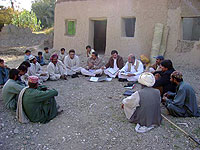Social Mobilization in slums of Islamabad – what good have development organizations contributed to our society
Thursday, March 29th, 2012 3:21:54 by Fayyaz Yaseen
Social Mobilization in slums of Islamabad – what good have development organizations contributed to our society
Social mobilization refers to the idea of sensitizing and mobilizing a society or community to address the social issues it faces. It is believed that without having a community on board, the effectiveness of development work undertaken
for its common good cannot be achieved in its true essence. It is for this purpose that all the NGOs, CBO’s and development or civil society organizations, before initiating with a project in a community or settlement, take its dwellers/ stakeholders on board
and try to proceed with every activity with their complete consent.
This entire exercise is deemed necessary not only because it enhances effectiveness of the development work, but also because it inculcates a sense of ownership among the people and encourages them to monitor progress of the project
and to provide their input to keep it on track.
Although every NGO, CBO and development or civil society organization is well aware of this fact, yet many of them do not regard its importance. Because if they did so, none of them could have proactively, although unintentionally,
killed the sense of collective responsibility of the communities they intend to work with by making false promises. You may feel bemused while trying to comprehend these points. But I believe you may get essence of the idea after going through the following
lines.
Recently, while working on a project on social accountability in education, I had a chance to interact with the communities in two of the slums in Islamabad. Enthusiastic about working on a relatively new idea in Pakistan that
could set a precedent for reforming entire education system in the country; we started working on the project by organizing periodic community meetings. Before going to the people, the research team to which I was a part had envisioned an active community
participation without much effort. However, when we actually got into the work, it seemed more of a challenging task.
Initially, I was bemused as to how people could remain indifferent to an issue that had a lot to do with their children’s education. Moreover, how could they offer a cold shoulder to the issues like the education of their daughters
and getting rid of corruption that had infused into the public schools where teachers would openly ask the students to join their tuition centers for better results in the exams?
However, as the project activities lingered on and coordination with the community members increased, gradually, their cooperation with the staff working in the field increased and finally, there came the day when we had the desired
level of participation from the local stakeholders. But this entire community sensitization activity could at best be described as painfully slow. To the project implementation team that had experience of working with the communities across Pakistan on dozens
of projects, this phenomenon depicted by the dwellers of slums in Islamabad was surprising, and naturally, they wanted to investigate the reasons behind it.
While digging deeper, and discussing the observations with community members including religious leaders and socially and politically influencing individuals, it prevailed that the dwellers of slums in Islamabad have become skeptical
of the NGOs and thus, they are not willing to believe them anymore. The reasons behind this increased skepticism are also quite interesting. In words of a pastor at Hansa Colony, “we have dozens of NGOs’ workers visiting us every week, all of them coming to
us with tall claims and huge promises of initiating development works but most of the times none of them would keep their words. Initially, after believing and mocked by most of them, now the community members do not believe them, and thus, they do not lend
an ear to what they say or the dreams they try to make us see and trust in.”
In words of a local political leader, “NGOs take funds from donors in our name, but after securing the money, they would never come back to us. We are a permanent source of generating income for them, then why would they want our
conditions to be improved.” To him, “on papers, hundreds of projects have been implemented in the slums of Islamabad by NGOs and development organizations; but can anyone ask them how much difference they have been able to create so far? Our lives have been
all the same, with virtually no improvement that can be attributed to the projects that are promised by the NGOs but that would never get implemented.”
For us, the researchers working on social accountability of education sector, this was a reality-check movement to hold ourselves – the development organizations, accountable of what we commit to our donors, communities and other
stakeholders and what we actually deliver.
Recently, the government has decided to devise and legislate over a mechanism that would keep check on financial affairs of the Non Government Organizations. To me, besides government, the communities should also be given the right
to hold these organizations accountable of what they actually deliver to the society. Only by doing so will we be able to stop those NGOs working in the field that are not only promoting corrupt practices but are also brining bad names to the organizations
that are genuinely aimed at elevating the social and economic status of the marginalized sections of the society and that are striving to restore ideal human rights conditions in Pakistan.
If a self analysis at this stage is not done, and an honest attempt to improve state of affairs on NGOs part is not made, we probably are on the way to add to the skepticism about us already prevailing among the common people of
the society.
The writer is a researcher and can be reached at
fayyaz@sdpi.org
Short URL: https://www.newspakistan.pk/?p=17514

















